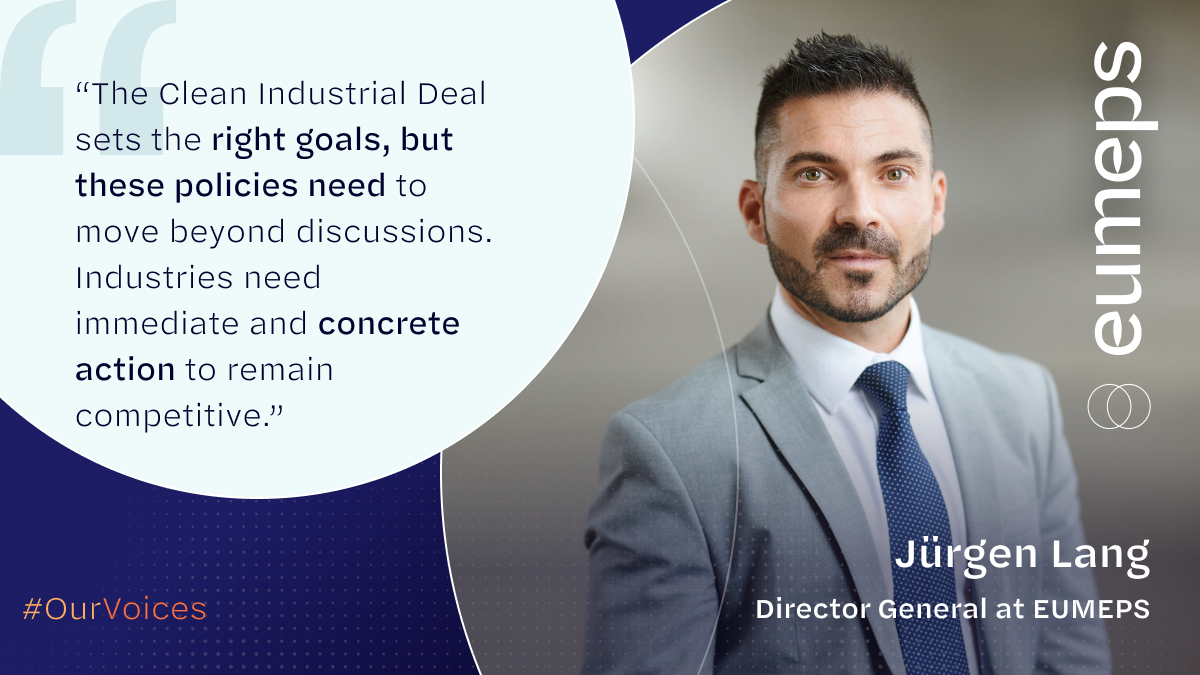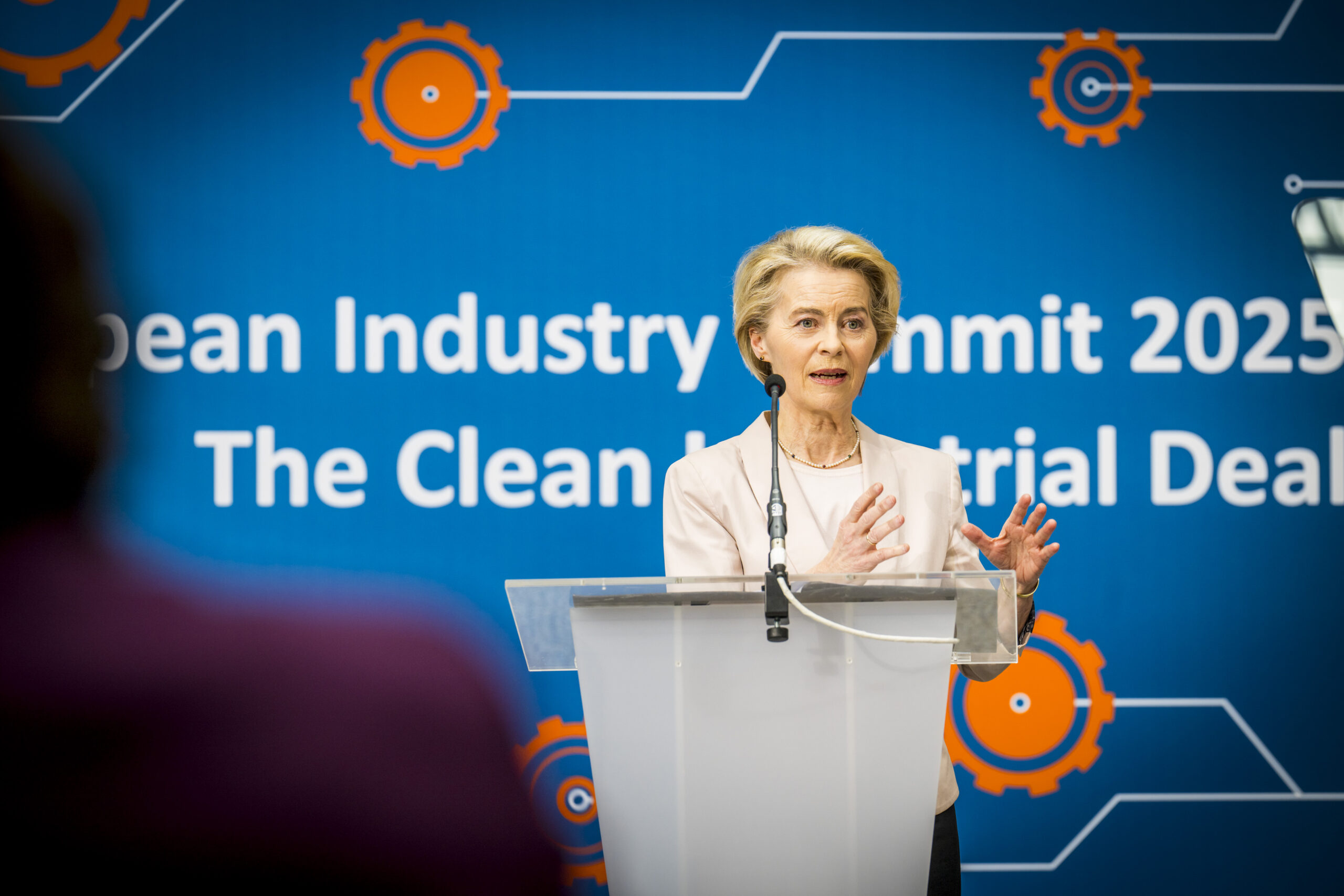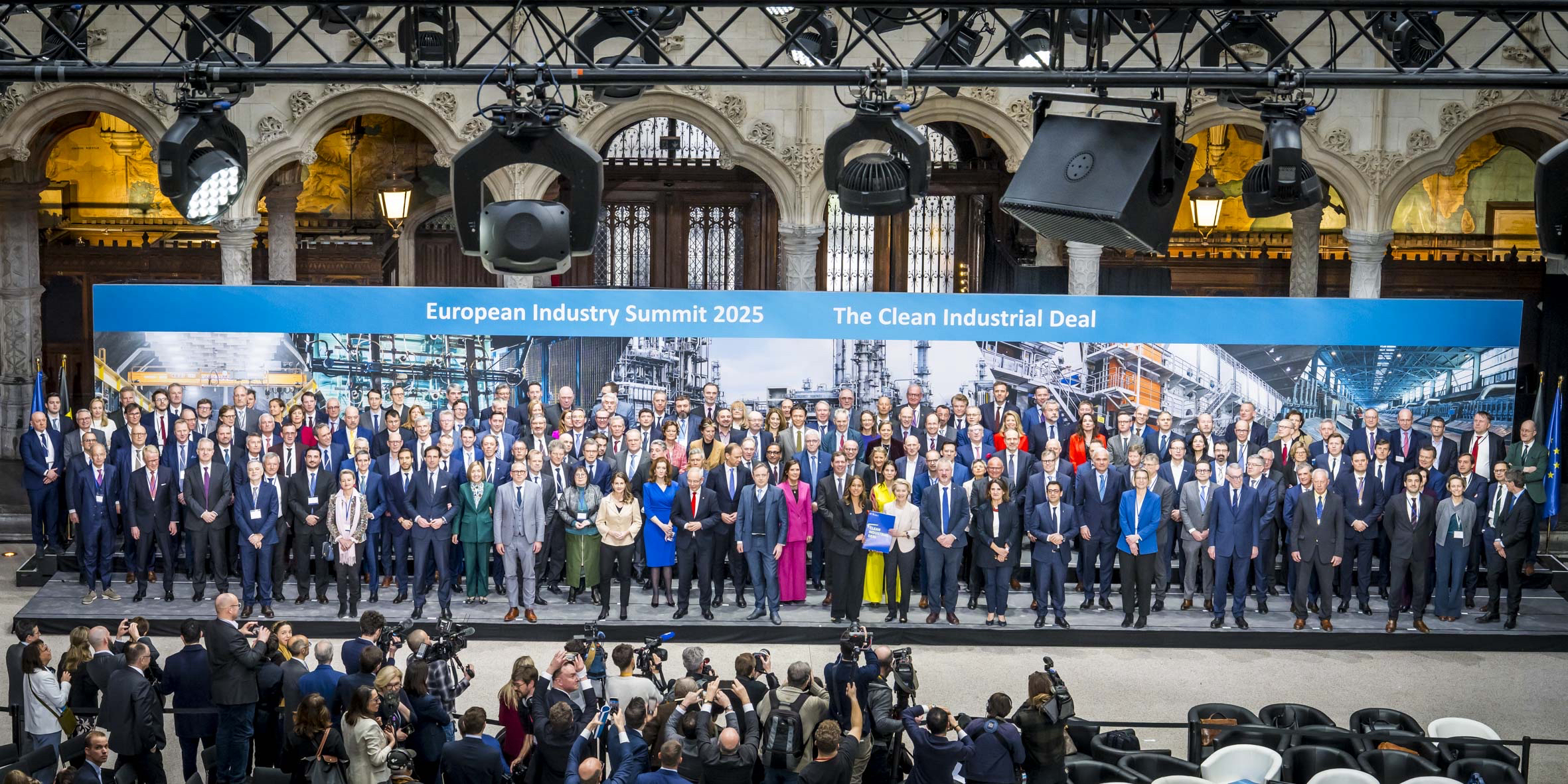On 27 February 2024, Antwerp hosted a high-level industrial summit where European Commission President Ursula von der Leyen unveiled the Clean Industrial Deal, a new framework aimed at accelerating Europe’s industrial decarbonisation while maintaining global competitiveness. This event was particularly significant as it marked the one-year anniversary of the Antwerp Declaration, a call from industry leaders urging the EU to ease bureaucratic constraints and create a more investment-friendly industrial policy.
Among the attendees was Jürgen Lang, Director General of EUMEPS, who represented the Expanded Polystyrene (EPS) industry to ensure that the EPS sector—a crucial player in energy efficiency, circularity, and industrial innovation—was part of the broader discussion shaping Europe’s industrial future.
This article explores the objectives of the Clean Industrial Deal, the key takeaways from the summit, and what it means for the EPS industry.
The Clean Industrial Deal: Europe’s New Industrial Strategy
 The Clean Industrial Deal is the European Commission’s response to increasing industrial challenges. With industries across chemicals, construction, energy, and manufacturing facing rising costs and regulatory pressures, the initiative aims to strike a balance between environmental ambition and economic sustainability.
The Clean Industrial Deal is the European Commission’s response to increasing industrial challenges. With industries across chemicals, construction, energy, and manufacturing facing rising costs and regulatory pressures, the initiative aims to strike a balance between environmental ambition and economic sustainability.
At its core, the Clean Industrial Deal provides a framework focused on energy security, circularity, investment, and regulatory efficiency. It introduces:
- Measures to stabilise energy costs, expand renewable energy capacity, and support industrial electrification.
- A €100 billion investment package to drive industrial modernisation, including a new Industrial Decarbonisation Bank.
- Stronger circular economy policies, reinforcing material reuse, waste reduction, and the upcoming Circular Economy Act (2026).
- Regulatory simplification, removing bureaucratic barriers that hinder industrial growth.
By addressing these core issues, the Clean Industrial Deal seeks to ensure that Europe remains a competitive and sustainable manufacturing hub. However, as many industry leaders pointed out during the summit, its success depends on swift and effective implementation.
Jürgen Lang’s Perspective: Key Takeaways from the Summit
 At the summit, Jürgen Lang noted that the Clean Industrial Deal was widely recognised as a step in the right direction, but there was an underlying sense of caution in the industrial community. Would the EU be able to translate its ambition into concrete action? This was the key question on everyone’s mind.
At the summit, Jürgen Lang noted that the Clean Industrial Deal was widely recognised as a step in the right direction, but there was an underlying sense of caution in the industrial community. Would the EU be able to translate its ambition into concrete action? This was the key question on everyone’s mind.
For Jürgen Lang, the most pressing issue was the urgency of action. The challenges facing European industries are already well-documented: high energy costs, regulatory uncertainty, and increasing competitive pressure from global markets. The Clean Industrial Deal sets the right objectives, but industries cannot afford to wait years for policies to materialise. As he put it:
"The urgency for action is clear. European industries are already struggling with high energy costs and regulatory uncertainty. The Clean Industrial Deal sets the right goals, but these policies need to move beyond discussions. Industries need immediate and concrete action to remain competitive."
This sense of urgency stems from the real and immediate pressures faced by European manufacturers, including those in the EPS sector. Rising production costs and complex regulatory requirements are already pushing companies to relocate outside of Europe. Without clear and immediate solutions, the risk of industrial decline will only grow.
Beyond speed, Lang also pointed to the need for investment to match ambition. The Clean Industrial Deal promises a €100 billion investment package, but there is widespread concern among businesses about how accessible these funds will be. In the past, complex application processes, slow approvals, and excessive bureaucracy have made it difficult for companies—especially SMEs and industries working on sustainability innovations—to benefit from EU funding. Without a more efficient system, even the best-intentioned policies risk failing in practice.
As Jürgen Lang highlighted:
"Investment must match ambition. The Clean Industrial Deal outlines significant funding opportunities, but businesses need clarity on how to access these resources. Without streamlined financial support, industrial transformation will remain slow."
Finally, regulatory stability remains a major concern. While industries are willing to invest in decarbonisation and circular solutions, they need long-term regulatory certainty to make informed decisions. Frequent changes to legislation, unclear timelines, and inconsistent enforcement have created an unstable investment climate that discourages companies from making large-scale commitments. Without a clear and predictable framework, many businesses will hesitate to invest in the green transition. Jürgen Lang summarised this challenge by stating:
"Regulatory stability is essential. Unclear and constantly shifting regulations make it difficult for companies to commit to long-term innovation and sustainability projects. The Clean Industrial Deal must provide industries with a stable, predictable framework."
These reflections echo a wider concern across the European industrial sector: while the Clean Industrial Deal presents a strong vision for the future, its effectiveness will depend entirely on swift implementation, transparent funding mechanisms, and a business-friendly regulatory approach. Without these elements, European industries will continue to struggle with uncertainty, slowing down the very transformation the Clean Industrial Deal aims to achieve.
What This Means for the EPS Industry
 The Clean Industrial Deal brings both opportunities and challenges for the EPS sector.
The Clean Industrial Deal brings both opportunities and challenges for the EPS sector.
A major focus of the deal is energy efficiency, particularly in the construction sector, which strengthens the case for EPS insulation as a critical material in reducing energy consumption and CO₂ emissions in buildings. By reinforcing the role of insulation in Europe’s decarbonisation strategy, this initiative could increase demand for EPS solutions.
Additionally, the circular economy framework outlined in the Clean Industrial Deal aligns with EUMEPS’s ongoing efforts to enhance EPS recycling and promote resource efficiency. With greater EU support for advanced recycling technologies, the EPS industry could benefit from increased investment and policy recognition.
Despite these opportunities, challenges remain. The slow implementation of EU policies has long been a problem, and many fear that the Clean Industrial Deal will face similar delays. Energy security is another pressing concern—without a stable and affordable energy supply, industries will struggle to maintain global competitiveness.
Finally, global competitiveness remains an issue. European manufacturers face stricter regulations than many international competitors, which creates an uneven playing field. The EU must ensure that sustainability policies do not disadvantage European industries in global markets.
Conclusion: From Political Vision to Industrial Reality
The Clean Industrial Deal represents a significant step forward in shaping Europe’s climate-neutral and high-performance industrial future. By addressing energy costs, circularity, investment, and regulatory challenges, the EU aims to provide a more sustainable and competitive framework for European businesses.
However, the success of this initiative depends on rapid and effective implementation. As Jürgen Lang observed, industries cannot afford further delays, unclear investment strategies, or regulatory instability. The EPS sector, represented by EUMEPS, is prepared to contribute to Europe’s green transition, but businesses need the right conditions to succeed.
As Ursula von der Leyen remarked in her closing speech: "We must be measured by what we deliver."
The time for action is now. EUMEPS remains committed to working alongside EU policymakers to ensure that the Clean Industrial Deal translates into real, tangible benefits for European industry, workers, and innovation.


